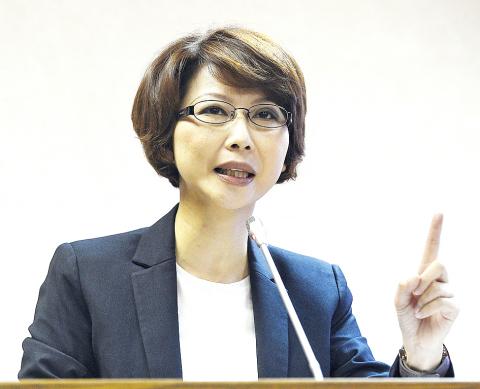Revelations that the military police, along with a military “counter intelligence agency,” have been criticized for operating with a Martial Law-era mentality after the detention and search of a civilian’s house to seize documents.
The scandal over the treatment of a man surnamed Wei (魏) who offered three historical documents for sale online last month has brought to public attention a shadowy military agency — the Military Security Brigade, which was set up as a special body by the Ministry of National Defense Political Warfare Bureau’s Security Division.
The Military Security Brigade is a counter intelligence organization that conducts surveillance, wire tapping, intelligence gathering and other clandestine operations against suspected dissidents and communist spies, and upholds internal security against leaks of state secrets and to investigate criminal activities by military personnel.

Photo: Chen Chih-chu, Taipei Times
The brigade was formerly part of the military’s Counterintelligence Corps and before the overall restructuring in 1992, it was run by the Taiwan Garrison Command, which was responsible for the arbitrary arrest, torture, imprisonment without trial and executions of tens of thousands of Taiwanese during the Martial Law era from 1949 to 1987.
It was often compared to the Stasi secret police of the former East Germany and also described as Taiwan’s Nazi SS unit during the Martial Law era, because the officers of Taiwan Garrison Command swore loyalty only to Chiang Kai-shek (蔣介石) and then his son, former president Chiang Ching-kuo (蔣經國), as they committed atrocities with impunity.
The Military Security Brigade still operates, remaining among the nation’s four intelligence-gathering secret services, the others being the National Security Bureau, the Military Intelligence Bureau and the ministry’s Office of Telecommunications Development.
Military Security Brigade Chief Colonel Wang Shih-wei (汪世偉) was summoned for questioning by prosecutors in the ongoing investigation into the case, while Security Division head Major General Chao Tai-chuan (趙代川) was removed from his post on Tuesday.
At the legislature’s Foreign Affairs and National Defense Committee meeting yesterday, Democratic Progressive Party (DPP) Legislator Chen Ting-fei (陳亭妃) accused the Military Security Brigade of orchestrated the operation, as they had officers accompanying military police personnel to meet Wei and were stationed outside Wei’s house to carry out surveillance throughout the day.
DPP Legislator Wang Ting-yu (王定宇) said he has obtained information that indicated Chao, as head of the Security Division, was the leading figure in the illegal search, coordinating with officers from Military Security Brigade.
Wang accused Chao of telling military police that search warrants were not necessary, and that Chao, along with officers of Military Security Brigade, approved the decision to carry out the operation on Feb. 19 to meet Wei and afterward lied to top military officials to try to cover up the misconduct.

Taiwan is stepping up plans to create self-sufficient supply chains for combat drones and increase foreign orders from the US to counter China’s numerical superiority, a defense official said on Saturday. Commenting on condition of anonymity, the official said the nation’s armed forces are in agreement with US Admiral Samuel Paparo’s assessment that Taiwan’s military must be prepared to turn the nation’s waters into a “hellscape” for the Chinese People’s Liberation Army (PLA). Paparo, the commander of the US Indo-Pacific Command, reiterated the concept during a Congressional hearing in Washington on Wednesday. He first coined the term in a security conference last

Prosecutors today declined to say who was questioned regarding alleged forgery on petitions to recall Democratic Progressive Party (DPP) legislators, after Chinese-language media earlier reported that members of the Chinese Nationalist Party (KMT) Youth League were brought in for questioning. The Ministry of Justice Investigation Bureau confirmed that two people had been questioned, but did not disclose any further information about the ongoing investigation. KMT Youth League members Lee Hsiao-liang (李孝亮) and Liu Szu-yin (劉思吟) — who are leading the effort to recall DPP caucus chief executive Rosalia Wu (吳思瑤) and Legislator Wu Pei-yi (吳沛憶) — both posted on Facebook saying: “I

The Ministry of Economic Affairs has fined Taobao NT$1.2 million (US$36,912) for advertisements that exceed its approved business scope, requiring the Chinese e-commerce platform to make corrections in the first half of this year or its license may be revoked. Lawmakers have called for stricter enforcement of Chinese e-commerce platforms and measures to prevent China from laundering its goods through Taiwan in response to US President Donald Trump’s heavy tariffs on China. The Legislative Yuan’s Finance Committee met today to discuss policies to prevent China from dumping goods in Taiwan, inviting government agencies to report. Democratic Progressive Party Legislator Kuo Kuo-wen (郭國文) said

The Ministry of Economic Affairs has fined Taobao NT$1.2 million (US$36,900) for advertisements that exceeded its approved business scope and ordered the Chinese e-commerce platform to make corrections in the first half of this year or its license would be revoked. Lawmakers have called for stricter supervision of Chinese e-commerce platforms and more stringent measures to prevent China from laundering its goods through Taiwan as US President Donald Trump’s administration cracks down on origin laundering. The legislature’s Finance Committee yesterday met to discuss policies to prevent China from dumping goods in Taiwan, inviting government agencies to report on the matter. Democratic Progressive Party